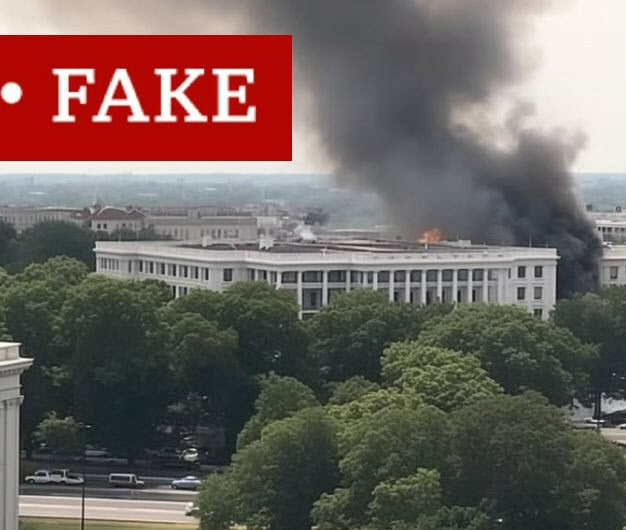Let’s post false photos on social media, etc.
Russian propaganda media also posted on Twitter
US stock market, gold and Treasury prices fluctuate at one time
‘Market chaos due to AI false information’ to reality
A picture of a fire at the US Department of Defense building (Pentagon) created by artificial intelligence (AI) spread rapidly online, causing a great uproar such as the US stock market fluctuating. This is the first case in which fake images created by AI have even affected the market amid growing concerns that the spread of false information using AI could threaten democracy. It was an incident that confirmed that the side effects of AI could be realized at any time, although the US Department of Defense went to evolution and narrowly sutured it, saying that “the photo was manipulated.”
According to Bloomberg News, a picture of black smoke rising from a building that looked like the Pentagon in Washington, D.C. on the 22nd (local time) quickly spread domestically and internationally through Twitter. Columns of black smoke soaring around the rectangular building resembling the Pentagon reminded me of the Pentagon, which was attacked during the 9/11 attacks in 2001.
According to US NBC News, this photo was first posted around 8:42 am on the same day on a paid account on Twitter. Later, the same photo was uploaded on a Facebook account associated with QAnon, a far-right conspiracy theory group with a tendency to support Trump.
Shortly after, at around 10:03 am, a post saying “There was an explosion near the Pentagon” was posted on the Twitter account of RT, a Russian propaganda media with 3.1 million followers. Three minutes later, the Bloombergfeed Twitter account, which purported to be Bloomberg News, circulated the photo under the title “Big explosion near the Pentagon.” Financial news site Zero Hedge, followed by 1.6 million people, also shared this fake photo. The account even had a ‘blue ticket’, a Twitter authentication mark that confirms that it is an official account. Finally, Republic TV, an Indian broadcaster, reported that an explosion had occurred near the Pentagon, citing RT.
The uproar subsided only after the Arlington, Virginia fire department, where the Pentagon is located, announced that “there were no explosions or accidents in or near the Pentagon.” “This image shows typical features synthesized by AI,” said Hanni Farid, an expert in digital forensics and a professor at the University of California, Berkeley, on Twitter. did.
The US stock market chugged amidst the manipulative photo frenzy. According to CNN, the Dow Jones 30 Industrial Average fell by about 80 points between 10:06 and 10:00 am, and then recovered three minutes later. The Standard & Poor’s (S&P) 500 index also reversed to a 0.15% decline at 10:09 am, but recovered its upward trend two minutes later. Gold and government bond prices also moved significantly at one time.
 The ‘White House Explosion’ was also manipulated Recently, photos of what appeared to be an explosion at the White House building appeared on social media in the United States. A new composite photo with the word “fake” written over it to warn that the image was created by artificial intelligence (AI) is also circulating. twitter capture
The ‘White House Explosion’ was also manipulated Recently, photos of what appeared to be an explosion at the White House building appeared on social media in the United States. A new composite photo with the word “fake” written over it to warn that the image was created by artificial intelligence (AI) is also circulating. twitter captureAfter fake photos of the Pentagon fire spread, images of the White House burning in imitation also spread online. However, the image was poor, so it did not have the same ripple effect as the image of the Pentagon.
When the photos of the Pentagon and White House fires were found to be false, Twitter accounts such as RT that spread these photos belatedly deleted or corrected their posts. But hundreds have already been shared. Bloomberg Feed, a paid account on Twitter that posted the manipulated Pentagon photo, was suspended on the same day. India’s Republic TV broadcast an apology.
This is not the first time AI-generated disinformation has been controversial. In March, a fabricated image of former US President Donald Trump being handcuffed and taken away was spread and caused controversy. On the 11th, the Irish media ‘Irish Times’ publicly apologized for posting fake articles written by AI after failing to filter them out.
Ahead of the US presidential election next year, voices are rising that false information or images that exploit AI will pose a serious threat to democracy. Sam Altman, CEO of OpenAI, emphasized the establishment of an AI regulatory body at a US Congressional hearing on the 16th, saying, “I am seriously concerned that AI can manipulate or sway public opinion by providing false information.”
Source: Donga
Mark Jones is a world traveler and journalist for News Rebeat. With a curious mind and a love of adventure, Mark brings a unique perspective to the latest global events and provides in-depth and thought-provoking coverage of the world at large.